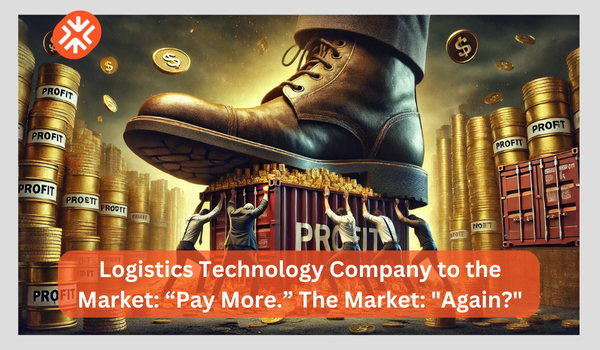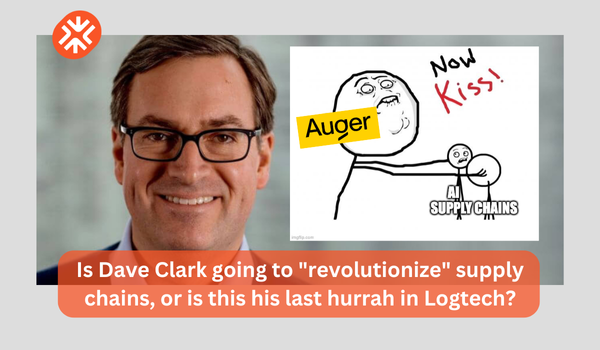Honey, we shrank VCs.
Venture Capital is in a weird place, with logistics and supply chain companies paying the price. Will they bounce back, or is this the end of logistics technology innovation through VC funding?

Venture capitalists have been on the receiving end of plenty of criticism, especially in the logistics and supply chain space. I’ve also, rightly or wrongly, been guilty of this. Money flooded in, as did a range of executives and founders from different industries, with varying backgrounds. The big problem is that success stories are few and far between, unless you consider a cash burning, decade-old start-up, with a terrible cap table, retaining its unicorn status from 18 months ago, a success.
Is venture capitalism as we know it about to fall off the cliff, or is this just a blip?
Sponsored by

Was it greed, or blissful ignorance?
You can’t trust everything you read on the internet. If you were to run a quick Google search (does anyone still use Google?) on the current state of venture capital, you will come to the conclusion that the world as we know it is ending. Frankly, it might well be, but as far as VCs are concerned, what we’re seeing is more likely the consequence of greed and a lack of ability to “zoom out”.
“The money is not making the round trip” - Marc Cadieux, president of SVB.
The agreement with VCs is quite simple: limited partners (LPs) give you money, you invest the money, turn it into more money, and give the LPs their cut of the benefits. The LPs then take some of that money and give it back to VCs to go again. Sounds great? Frankly, it is. The model has been around in its current form since 1946, and has greatly contributed to the creation of the world we have today (for better or worse). The problem with this model though, is that it requires the VCs to invest the money well. And frankly, they haven’t been.
Over recent years, we’ve become obsessed with charismatic founders, big-burning start-ups, and chasing unicorn status. Been a start-up for nearly a decade, still unprofitable, with questionable customer churn, but you’re in a “hot" industry? Here’s a series D, doubling your valuation, spend it wisely wink wink.

Ignorance.
Is it really that hard to blame VCs for their logistics and supply chain failings? Plenty of people bought into crypto when Bitcoin was at US$60k and US$70k. Many fell prey to their favourite influencers pushing NFTs to the tune of millions of dollars. The difference is that these people are what they call “retail investors”, and they aren’t trained to know any better.

On the other hand, VCs are expected to have the experience, processes, and knowledge, to avoid investing at the top, or getting caught out by a dud. Sure, retail investors can wait it out for the next decade and hope that Bitcoin hits new highs. But VCs have an agreement to uphold and are required to redistribute capital to the LPs.
How can you honor your contract and keep the cycle going if you’re going to throw US$260mn at a Series E round in Convoy at a US$3.8bn valuation, just to see the company sold for cents on the dollar 18 months later? The best part of that move being that the acquiring party was Flexport, another VC success story, once valued at US$8bn, now probably worth less than total funding received.
It feels like a big chunk of the money people chose to turn a blind eye to the potential decline of freight rates, capacity issues, consumer purchasing power crunch, and more factors with the potential to turn their “sure thing” from 2021-2022 into their “worst investment to date” by 2024.
Greed.
Greed was omnipresent in logistics during the pandemic. The way carriers and forwarders gamed the system with “volontary surcharges” to squeeze more out of their customer base was somewhere along the lines of evil genius. Who needs to increase rates when you can just slap another few billable line items onto the quote and know that your customer has no choice but to accept it?
This greed clearly spread to the VCs who maybe misunderstood that the insanity we were seeing was only temporary, and that the results posted during this time by the VC tech darlings were nothing more than anomalies, for the most part. This isn’t to say that there aren’t some great companies out there right now who continue to deliver. They all appear to have something in common though: they didn’t get ahead of themselves. They raised well, with a plan for sustainable growth, and they’ve continued on that trajectory. Those companies - Overhaul, Gnosis, Cargoai, Lineage (not tech, but frankly I like the tangible nature of the business). These businesses seem to have a future, whereas many others just seem lost, waiting to be acquired or to finally have to shut up shop.
Greed, alongside FOMO (Fear of Missing Out), has been a determining factor in VCs making terrible plays, and logistics technology companies failing hard. Flexport’s Founder and CEO has previously stated that they may have raised too much, leading to poor spending strategy. I’m not going to disagree with that.

How it all got flipped-turned upside down
"Alongside this unprecedented freight market collapse, the dramatic monetary tightening we’ve seen over the last 18 months has dramatically dampened investment appetite and shrunk flows into unprofitable late stage private companies” - Dan Lewis, CEO of Convoy
Here’s the situation: you’ve raised enough money to buy a small country, and spent most of it before the ink on the check dried. The hot market was a race to the bottom, not the top. More spending didn’t equal better results. What do you do now?
It feels like the answer to this question was to go and raise more money, and then a bit more, and finally some more for good measure. Why not right? Funding felt like it was on tap, and FOMO plus sky high freight rates and capacity issues were fueling some kind of frenzy. It was fun to watch as an outsider, but also concerning. Anyone who knows anything about logistics and supply chains knows that everything is cyclical. Shortages quickly turned into full warehouses and overstocking. Blank sailings become the norm. We all know the story, we lived through it.
The gamble didn't pay
Money was easy when the market was hot. But as things started to cool down, the idea of raising more money to throw at sales and marketing or hiring another few dozen developers to solve an obstacle went from the norm to impossible. This is why I love context.
In a hot market, logistics technology companies with huge funding, backed by big names, with headcount growing orders of magnitude faster than new customer sales, flashy sales and marketing campaigns, and their dedicated episode on the latest and greatest supply chain podcast... Well they were hot property and a prime candidate for further funding.
But with the turning of the tides came a shift in context, and perception. I remember reading an article from Y combinator back in 2022 stating that companies who didn't already have over 2 years of runway were in for a world of pain. I just didn't realize at the time just how much pain. Product, sales and marketing, customer care... nobody was safe.
The problem went deeper than just bloated teams and redundant resources. These companies didn't have real products to sell. I won't name any names, as many of these companies with their backs to the wall are now highly litigious (just google "project44" and "lawsuit" if you want to read some examples). Some of these companies took upwards of US$50mn from investors to build dashboards powered by XML data uploads. That's daylight robbery and those investors should ask for their money back. They should then take that money, give it back to their limited partners, and never invest in logistics and supply chain technology again.

Where's the exit?
Here's the thing with theme park rides: once you're in your seat with the belt fastened, you're not getting off until it is over.
These logistics technology companies are the rides, with the VCs and limited partners locked in until someone finds an exit. Sure, the secondary market is doing well right now, but using that is like jumping from a rollercoaster without a parachute - you will get hurt. Limited partners are taking hits as they don't have the patience, or the possibility, of staying in the game.
Do we need to talk about the IPO market? Sure, we've had Freightos (they didn't really have a choice did they?) and Lineage take that route, but that's about it. The IPO market has gone from an actual exit option for great companies and a way for investors to see a pay off, to the place companies go once they've exhausted VC and PE options. To break this cycle, we'll need a number of solid IPOs to happen in quick succession, which is highly unlikely today, and depending on how things evolve, may remain improbable for years to come.
“It takes a longer time to exit and not all people have the patience. And they forget the compounded nature of exponential growth,” - Dovi Frances, General Partner at Group 11.
Some people will have you believe that LPs are exiting due to a lack of patience and understanding of how exponential growth works. I challenge these people to take a single look at Flexport, project44, or any other highly funded logistics technology company with a valuation sitting at 80% or less of their all time highs. This isn't a patience or an exponential growth problem - this is about people wanting to invest their money where they will at least get some returns, rather than wait for a potential posthumous IPO.
The light at the end of the tunnel
One man's trash is another man's treasure. Maybe referring to some logistics technology start-ups as "trash" is distasteful, but frankly, with the way some of them have treated their employees, customers, partners, and investors, it is merited.
Some of these companies may appear as trash to their investors who are now desperate to recoup some of that initial investment to reposition elsewhere, but to the eagle-eyed competitor or adjacent player with a plan, they appear as raw potential. There are a number of acquisitive tech companies, LSPs, BCOs, and PEs with shopping lists ready to go. The rumor-mill is spinning on this front, and there are already a number of deals in the pipeline across logistics technology.
At the end of the day, just because a start-up couldn't make it work doesn't mean that they had a bad product. For the most part, many of them had too much money thrown at them and unprepared founders who couldn't meet investor expectations. Those are the ones to look for when shopping, as their situation is bad enough for them to have to sell, yet their product and roadmap is good enough to be worth the effort.
The winners, the losers, and what's next?
Aside from the employees that have given years of their lives to unscrupulous founders, the big losers are the specialists. Those VCs like Nine Realms and Prequel Ventures who niche down and focus on something specific. The interest in logistics and supply chain overall has dropped significantly, as pointed out in a previous post, and that trend isn't reversing yet. Nine Realms are yet to announce the closing of their first fund, something that I hope will happen. I've had the pleasure of speaking with their team, and the mixture of passion, conviction, and drive is contagious. They are paying the price of the generalists greed and mistakes, which will make their future success all the sweeter.
Speaking of the generalists, the "sprayer-prayers" will exit logistics and supply chain leaving behind them an unimpressive path of chaos and destruction. From the outright strange (P44's US$80mn round with Generation Investment getting involved... Did that green product ever see the light of day?) to the criminal (surely someone at Goldman knew what was happening at Slync, right?), we've seen it all. Thankfully, the spray and pray technique didn't really find a home in our industry, and has now moved on to all things AI... That seems like a great idea... Nothing will go wrong there.
Time to crack open the war chest
The big winners are the acquisitive incumbents and PEs with a war chest. They'll get interesting concepts, solid early-stage solutions, or the possibility to acquire entire teams of knowledgeable and experienced people, for the financial equivalent of peanuts.
In the past week alone, I have learned of multiple moves happening. There is a rather successful logtech start-up going for a 10x multiple, currently working things out with a prospective PE buyer. Another logtech player with what I've been told by unbiased 3rd parties is a selling for peanuts. Why? Because they couldn't find customers willing to pay due to fatigue and others consistently screwing customers around. These are just two of dozens of examples I hear about every week. The potential for consolidation is huge, and the buyers always have the same profiles: they are the big burners who still have money available, incumbents who are successful in adjacent verticals or with complementary products, and private equity players who want to Frankenstein their way to the top through multiple acquisitions.

The situation is so dire for some logistics technology start-ups, that finding a buyer isn't even an option. At best, they can hope for an acquihire situation, before having to simply pull the plug.
Things are moving fast. Blink, and you'll miss the deal you've been waiting for.
Special mention: AI
Are you still torn on the usefulness of AI? Yes? Good, me too. But the truth is, its here, and here to stay. After having a couple of conversations last week with some rather sizeable logistics technology start-ups, I'm cautiously optimistic about what 2025 has in store for AI in logtech.
AI is single-handedly changing the VC landscape right now, with the rise of the "Megafunds" (sounds ominous, right?) investing heavily in those insanely expensive AI start-ups. It is only a matter of time before AI invades logistics technology (what we've seen so far is entry-level in comparison to what is coming), and with that invasion will come a new wave of VC money, ready to disrupt our antiquated technology and archaic processes. And so the cycle will repeat, the question being: will they learn their lessons from the first half of this decade, or will they come back as bullish and arrogant as ever?
I think we all already know the answer to that question.
Want more? Click the image below to access my LinkedIn profile and send me a connection request or follow for more content.

You'll find regular posts on LinkedIn, and can sign-up for the Wiser Logtech #Recap edition on LinkedIn by clicking the button below.
Subscribe on LinkedInThe #Recap edition is weekly or fortnightly, depending on how much is happening in the industry, and covers multiple topics in a short story format, along with key updates on tech, investment, M&A moves, and more.
Latest #Recap edition below:

Thanks for reading, see you in a couple of weeks for the next one - and don't forget to get it done 💪 in the meantime.







